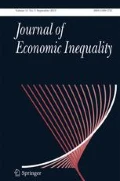Abstract
The idea that developing countries face a trade off between poverty and inequality has had considerable influence on thinking about development policy. The experience of developing countries in the 1990s does not, however, reveal any sign of a systematic trade off between measures of absolute poverty and relative inequality. Indeed, falling inequality tends to come with falling poverty incidence. And rising inequality appears more likely to be putting a brake on poverty reduction than to be facilitating it. However, there is evidence of a trade off for absolute inequality, suggesting that those who want a lower absolute gap between the rich and the poor must in general be willing to see lower absolute levels of living for poor people.
Similar content being viewed by others
References
Amiel, Y. and Cowell, F.: Thinking about Inequality: Personal Judgment and Income Distributions, Cambridge University Press, Cambridge, MA, 1999.
Anand, S. and Kanbur, S.M.R.: The Kuznets process and the inequality-development relationship, J. Development Economics 40 (1993), 25–52.
Besley, T. and Burgess, R.: Halving global poverty, J. Economic Perspectives 17(3) (2003), 3–22.
Bruno, M., Ravallion, M. and Squire, L.: Equity and growth in developing countries: Old and new perspectives on the policy issues, in V. Tanzi and Ke-young Chu (eds), Income Distribution and High-Quality Growth, MIT Press, Cambridge, MA, 1998.
Chen, S. and Ravallion, M.: How have the world’s poorest fared since the early 1980s?, World Bank Research Observer 19(2) (2004), 141–170.
Cowell, F.: Measurement of inequality, in A.B. Atkinson and F. Bourguignon (eds), Handbook of Income Distribution, North-Holland, Amsterdam, 2000.
Datt, G. and Ravallion, M.: Growth and redistribution components of changes in poverty measures: A decomposition with applications to Brazil and India in the 1980s, J. Development Economics 38 (1992), 275–295.
Datt, G. and Ravallion, M.: India’s checkered history in the fight against poverty: Are there lessons for the future?, Economic and Political Weekly 31 (1996), 2479–2486.
Fields, G.S.: Distribution and Development, Russell Sage, New York, 2001.
Honohan, P.: Inequality and poverty, J. Economic Perspectives 18(2) (2004), 271–272.
Kakwani, N.: Poverty and economic growth with application to Côte D’Ivoire, Review of Income and Wealth 39 (1993), 121–139.
Kraay, A.: When is growth pro-poor? Evidence from a panel of countries, J. Development Economics, forthcoming.
Kolm, S.: Unequal inequalities I, J. Economic Theory 12 (1976), 416–442.
Kuznets, S.: Economic growth and income inequality, American Economic Review 45 (1955), 1–28.
Lipton, M. and Ravallion, M.: Poverty and policy, in J. Behrman and T.N. Srinivasan (eds), Handbook of Development Economics, Vol. 3, North-Holland, Amsterdam, 1995.
Ravallion, M.: Growth and poverty: Evidence for developing countries in the 1980s, Economics Letters 48 (1995), 411–417.
Ravallion, M.: Growth, inequality and poverty: Looking beyond averages, World Development 29(11) (2001), 1803–1815.
Ravallion, M.: Competing concepts of inequality in the globalization debate, in S. Collins and C. Graham (eds), Brookings Trade Forum 2004: Globalization Poverty and Inequality, Brookings Institution, Washington, DC, 2004.
Ravallion, M. and Chen, S.: What can new survey data tell us about recent changes in poverty and distribution?, World Bank Economic Review 11(2) (1997), 357–382.
Ravallion, M. and Chen, S.: China’s (uneven) progress against poverty, Working Paper 3408, World Bank, 2004 (http://econ.worldbank.org/resource.php?type=5).
Ravallion, M. and Huppi, M.: Measuring changes in poverty: A methodological case study of Indonesia during an adjustment period, World Bank Economic Review 5 (1991), 57–82.
Author information
Authors and Affiliations
Additional information
Martin Ravallion: These are the views of the author, and need not reflect those of the World Bank or any affiliated organization.
Rights and permissions
About this article
Cite this article
Ravallion, M. A poverty-inequality trade off?. J Econ Inequal 3, 169–181 (2005). https://doi.org/10.1007/s10888-005-0091-1
Accepted:
Issue Date:
DOI: https://doi.org/10.1007/s10888-005-0091-1




